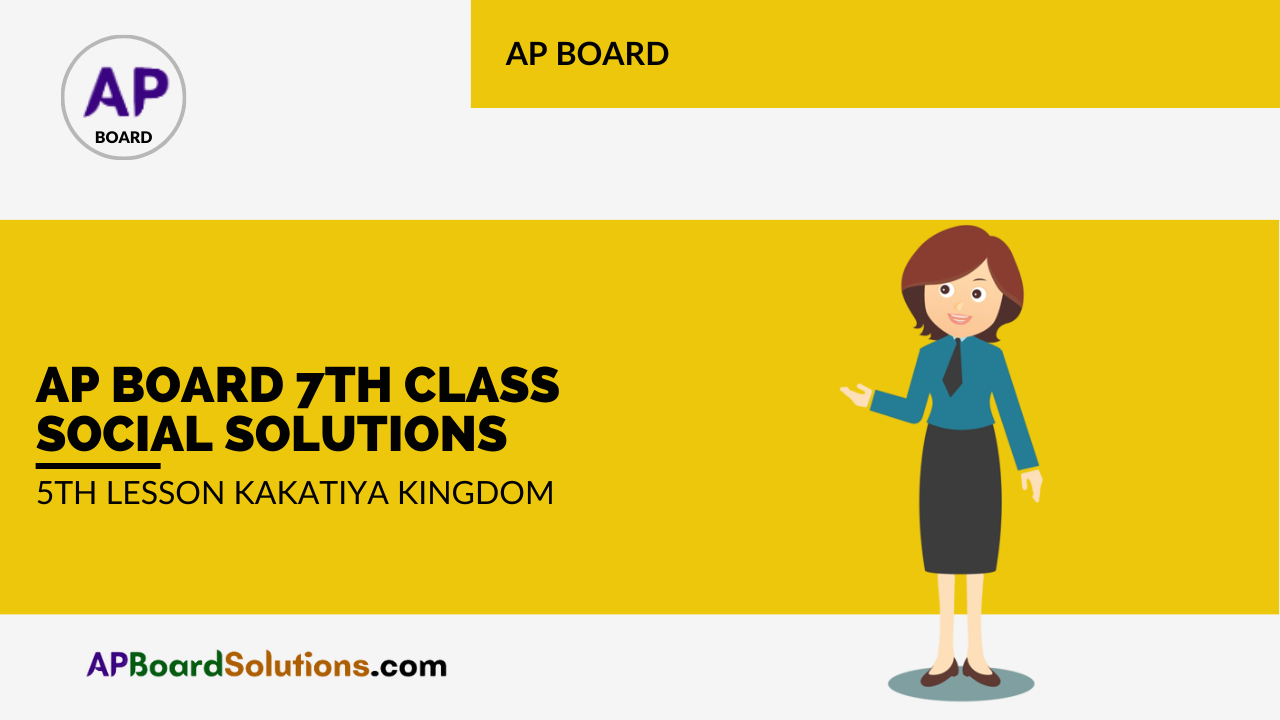SCERT AP 7th Class Social Study Material Pdf 5th Lesson Kakatiya Kingdom Textbook Questions and Answers.
AP State Syllabus 7th Class Social 5th Lesson Questions and Answers Kakatiya Kingdom
7th Class Social 5th Lesson Kakatiya Kingdom Textbook Questions and Answers
Review Of Your Previous Knowledge
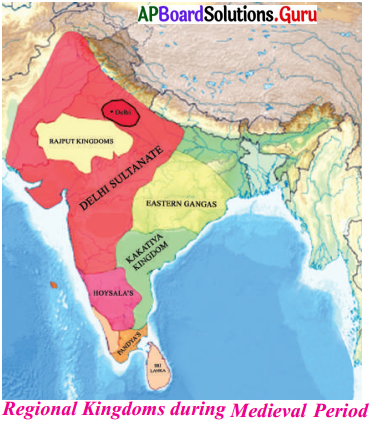
Observe the given Map and respond to the following questions.
Question 1.
Which dynasties do you observe in the given map?
Answer:
- Rajput kingdoms
- Delhi Sultanate
- Eastern Gangas
- Kakatiya kingdom
- Hoyasalas
- Pandyas
Question 2.
According to given map who ruled Andhra region?
Answer:
Kakatiya Kingdom.
![]()
Question 3.
Name the South Indian kingdoms in the given map?
Answer:
- Delhi Sultanate
- Eastern Gangas
- Kakatiya Kingdom
- Pandyas.
Improve Your Learning
I. Answer the following questions.
Question 1.
How did the Kakatiyas emerge as independent rulers?
Answer:
- Early Kakatiyas served as feudatories to the Rashtrakutas and the Western Chalukya kings.
- They were holding the posts of village heads called Rattadi and through their military skills became army chiefs, Samanthas, etc., and gained control over Ammakonda in Telangana.
- The Kakatiyas emerged as independent rulers after the fall of Western Chalukyas.
Question 2.
Explain about the Kakatiya’s Administration.
Answer:
Kakatiya’s Administration :
- The administration of the kingdom was organised on a military basis.
- The Kakatiyas divided their territories among a number of military chiefs known as Nayankara.
- The Nayankara had to maintain a stipulated number of troops for the services of the king.
- The village administrative divisions were divided into two main classes, the Sthala and the Nadu.
- The Sthala consisted of a group of villages ranging perhaps from 10 to 60 in number.
- Nadu formed out of a combination of several Sthalas.
- The villages were looked after by village officials called Ayagars.
- The village was the basic unit of administration.
Question 3.
Who were Nayankara? Why were they appointed?
Answer:
Nayankara who served as a feudatory to the Kakatiyas obtained grants of lands from the Kakatiya monarchs to enable them to maintain their status.
“The skilled warriors are called Nayankar.”
They were appointed to collect the taxes and maintain the army.
These Nayankaras were always loyal to the king or queen.
Question 4.
Describe the Kakatiya art and architecture.
Answer:
Art and Architecture of Kakatiyas :
- The Thousand pillar temple and Ramappa temple were glorious constructions of the Kakatiya dynasty.
- The iconic Kakatiya Toranam was built by Ganapathi Deva.
- The scenic Pakhal Lake in Warangal is one of the famous.
- The Thousand pillar temple has rock cut elephants and the monolithic dolerlte rock Nandi are the main attractions.
- Ramappa temple was built with brick.
- The carvings on them depict flowers, creepers, elephants, gandharvas, dancers, epic stories, etc.
- Among the statues Yakshini’s and Nagini’s are most attractive.
- Some of the pillars of that temple produce Saptaswaras.
- Kakatiya temple architecture shows fantastic smooth carving of black-marble stone.
- They followed Mandapa, Antaralaya and Garbha griha model with pillar sculptures. This style is called Thrikuta method.
- UNESCO recognised this art and architecture as world heritage centres.
![]()
Question 5.
Read Introduction paragraph “During medieval period …………. art and architecture” comment.
Answer:
During the medieval period five important kingdoms are there in South India. Among them Kakatiyas are very famous.
- Though they faced so many rampages from other kingdoms the Kakatiya’s did their best to protect their kingdoms.
- They put more effort to promote unity among the regions which are under their control.
- They encouraged local languages with the help of poets and scholars.
- They protect their own architecture with the construction of temples and arches, etc.
Question 6.
Rudrama Devi, Ganapathi Deva, Prola raj II, Mahadev Rudra deva. Following rulers arrange in a chronological order.
Answer:
Kakatiya Rules:
- Prola Raju-II : 1115-1157 C.E
- Maha Deva : 1195-1199 C.E
- Ganapathi Deva : 1199-1262 C.E
- Rudramma Devi : 1262-1289 C.E
Question 7.
A European traveller visited Rudrama Devi reign. Who was he and which country did he come from?
Answer:
Marco Polo an Italian traveller visited Rudrama devi’s court.
Question 8.
Write a short note on the Economic and Social life of people in the Kakatiya reign.
Answer:
Economic Social life of people :
- Some of the farmers get the land from the king on rent purpose these are called Artha Seeri.
- The Kakatiyas brought large tracts of forest land under cultivation.
- For the encouragement of agriculture rulers dug many tanks and constructured reservoirs.
- During this period trade tax, lllari (house tax), Pullari (forest products), tax upon of flock (Addapatlu Sunkam) were imposed.
- The imposed professional tax on artisans.
- They appointed officials called Sunkadhikavisfor tax collection.
- The Kakatiya kings gave much importance to foreign trade.
- They developed Motupalli Port for this purpose.
- In this period many women members of royal families made land grants.
- Land, tanks, money, cattle, jewellery, etc., were donated to temple’s, brahmins and others.
Question 9.
Which regional dynasties emerged in the south India in Medieval era?
Answer:
During the medieval period five important kingdoms emerged in South India.
They are:
- The Chalukyas of Kalyani,
- The Yadavas,
- The Kakatiyas,
- The Hoyasalas and
- The Pandyas.
Question 10.
Locate the following places in India map.
a) Godavari river b) Motupalli c) Warangal d) Devagiri
Answer:
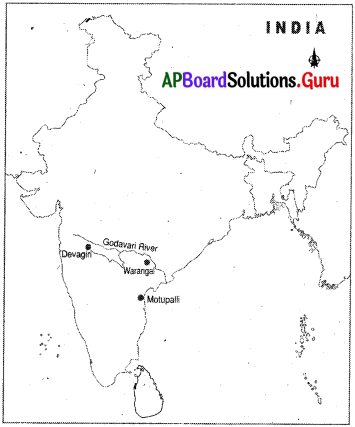
II. Choose the correct answer.
1. Founder of the Kakatiya Dynasty was ………….
a) Gundyana
b) Recharla Rudra
c) Ganapathi deva
d) Jayapa
Answer:
a) Gundyana
2. The Kakatiyas worshipped the mother goddess ……………..
a) Ammathalli
b) Kakati
c) Tripurasundari
d) Maisamma
Answer:
b) Kakati
3. Siva tatava saaram was written by ……………..
a) Mallikharjuna Panditharadya
b) Jayapa
c) Palkurki Somanadha
d) Nanne Choda
Answer:
a) Mallikharjuna Panditharadya
4. In every village some land was kept under king’s possession it was …………….
a) Velipolam
b) Rachapolam
c) Thotapolam
d) All the above
Answer:
b) Rachapolam
5. Motupalli inscription was issued by ………………
a) Rudrama Devi
b) Rudra Deva
c) Prataparudra
d) Ganapathi Deva
Answer:
d) Ganapathi Deva
III. Match the following.
| Group-A | Group-B |
| 1. Basava puranam | a) Vidhyanadha |
| 2. Kumara Sambhavam | b) Palkurki Somanadha |
| 3. Nrutya Ratnavali | c) Nanne Chodudu |
| 4. Pratapa Rudreeyamu | d) Tikkana |
| 5. Srimadandhra Mahabharatam | e) Jayapa |
Answer:
| Group-A | Group-B |
| 1. Basava puranam | b) Palkurki Somanadha |
| 2. Kumara Sambhavam | c) Nanne Chodudu |
| 3. Nrutya Ratnavali | e) Jayapa |
| 4. Pratapa Rudreeyamu | a) Vidhyanadha |
| 5. Srimadandhra Mahabharatam | d) Tikkana |
IV. Fill in the blanks with suitable words.
1. Ramappa temple is located at ………………… .
2. Vilasa Grant referred to ………………… Nayaka.
3. Rekhapalli lies in the ………………… river basin.
4. Educational institutions Ghatikas were established by ………………… kingdom.
5. Capital of Yadavas ………………… .
Answer:
- Warangal near Palampet village.
- Prolaya
- Sabari
- Chalukyas of Kalyani
- Devagiri
Puzzle
Draw boxes with help of given clue words.
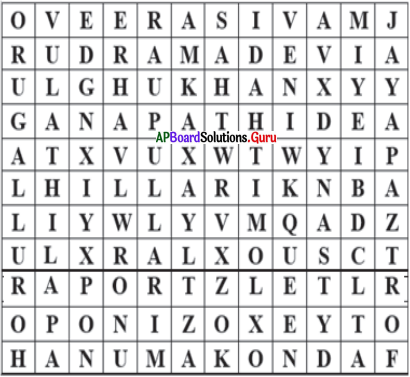
1. Early capital of Kakatiya’s (11)
2. Women ruler in Kakatiya’s (11)
3. New capital of Kakatiya’s (8)
4. Prataparudra lost his throne due to the invasion of (9)
5. Nrutya ratnavali written by (6)
6. A fortified building called (4)
7. Women ruler (5)
8. Tax on forest products (7)
9. House tax (6)
10. The place where ships are allowed (4)
11. Founder of Chalukyas (7)
Answer:
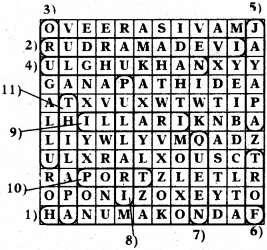
- Hanukonda
- Rudrama Devi
- Orugallu
- Ulghu Khan
- Jayapa
- Fort
- Queen
- Pullari
- lllari
- Port
- Thilapa
7th Class Social 5th Lesson Kakatiya Kingdom InText Questions and Answers
7th Class Social Textbook Page No. 72
Question 1.
Have you heard any news related to ancient excavations and remains of historical monuments? Discuss in class.
Answer:
Yes, I heard some news about excavations in recent times.
Madurai: A granite plough and a tiny terracotta cubical dice have been found during the latest excavations at Keeladi ancient site in Tamilnadu.
R. Sivanatham, Deputy Director of Archaeology, State Archaeological Department, said the cubical dice has numbers one, two, three, four, five and six marked on it with depressions.
The three-sided granite plough is indicative of the fact that the people of Keeladi was indulged in farming according to him.
Think & Respond
7th Class Social Textbook Page No. 68
Question 1.
How do you think Rudrama Devi got those brave adventurous qualities?
Answer:
It was possible because that she was trained well from her childhood in the martial arts as well as in administrative skills.
They helped her to lead large armies and become a good administrator.
![]()
7th Class Social Textbook Page No. 69
Question 2.
Why did the Kakatiya rulers transfer the Nayankaras frequently?
Answer:
Nayankara were given several villages from where they could collect tax, but they did not keep the villages permanently.
They could be transferred at the will of the king to a new place.
7th Class Social Textbook Page No. 71
Question 3.
What aspects do you observe while visiting a temple?
Answer:
I observed the following aspects :
- This temple is famous for Vishnu and Siva being combinedly worshipped in the same place.
- Temple was built with brick.
- The statues of this temple were made of black granite stone.
- They used decorative art very beautifully.
- The statue of Nandi here is very splendid.
- Some of the pillars of that temple produce Saptaswaras.
7th Class Social Textbook Page No. 73
Question 4.
Why did all the local kings form into an alliance?
Answer:
The local kings formed an alliance to protect themselves from Muslim invasions.
Ex : Prolaya Verna Reddy and Prolaya Nayaka had joined efforts to drive the Muslim rule out from their area.
Explore
7th Class Social Textbook Page No. 64
Question 1.
Know the duration of the Medieval period with the help of your teacher.
Answer:
The Medieval period may be divided into two periods.
1. The Early Medieval period which lasted from the 6th to the 13th century and the “Late Medieval period” which lasted from the 13th to 16th century, ending with the start of the Mughal empire in 1526 A.D.
7th Class Social Textbook Page No. 67
Question 2.
Find out more details about Kakatiya Kala Thoranam from the internet.
Answer:
- The arch was built around 12th century during the rule of Kakatiya dynasty.
- The monument was included in the list of UNESCO World Heritage site.
- The Warangal Fort has four Arnamental gates to the destroyed great Shiva temple which are known as Kakatiya Kala Toranam.
- These gates or arches in the Warangal Fort are said to have similarities with the gateways of the Sanchi Stupa.
![]()
7th Class Social Textbook Page No. 73
Question 3.
Let us discuss : What do we learn from History?
a) We should know the past and act wisely in future.
b) We should learn the heritage and culture from the past
Now add your opinion ……………………
…………………………………………………..
Answer:
- History helps us develop a better understanding of the world.
- History teaches a working understanding of change.
- History gives us the tools we need to be decent citizens.
- History makes us better decision makers.
Project Work
Collect the pictures related to Kakatiya kingdom and prepare photo album.
Answer:
